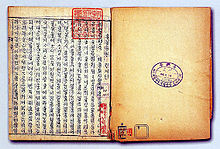
Back Хон Гільдон Byelorussian Hong Guildongjeon Catalan Hong Gil-dong German La Légende de Hong Gildong French Hong Gildong Hungarian Hong Gildong jeon ID Hong Gildong jeon Italian 洪吉童 Japanese 홍길동전 Korean Хон Гильдон (персонаж) Russian
| Hong Gildong jeon | |
 Opening page of Hong Gildong jeon. | |
| Korean name | |
|---|---|
| Hangul | 홍길동전 |
| Hanja | |
| Revised Romanization | Honggildongjeon |
| McCune–Reischauer | Honggiltongjŏn |
Hong Gildong jeon (Korean: 홍길동전) is a Korean novel, often translated as The Biography of Hong Gildong, written during the Joseon Dynasty. The novel is considered an iconic piece of Korean literature and culture.
Hong Gildong, an illegitimate son of a nobleman and his lowborn concubine, is the main character of the story. Gifted with supreme intelligence and supernatural abilities, he steals from rich and corrupt aristocrats, which has drawn him comparisons to famous bandits like the English folk hero Robin Hood and Australia's Ned Kelly. Historical sources point to the existence of a bandit named Hong Gildong who was arrested in 1500,[1] but the historical inspiration for the character was the Korean bandit and folk hero Im Kkeokjeong, who lived in the early 16th century.[2]
The character of Hong Gildong has become a mainstay of Korean culture and literature. In Korea today, Hong Gildong is a common placeholder name, similar to John Doe in the United States.[3] Charles Montgomery of the website Korean Literature in Translation explains, "In Korean literature Hong Gildong is legion. He is a fixture from one of the most important early novels in Hangul – he is the first truly 'Korean' main character".[4] Professor Minsoo Kang writes in the foreword to his translation, "The Story of Hong Gildong is arguably the single most important work of classic (i.e., premodern) prose fiction of Korea, in terms of not only its literary achievement but also of its influence on the larger culture".[5] NPR's Ari Shapiro explained on Fresh Air, "Sometimes, a single character can help define a country's sense of self. Here in the U.S., you might think of Jay Gatsby in The Great Gatsby or Superman. In North and South Korea, it's Hong Gildong".[6]
- ^ "The Rumpus Interviews With Minsoo Kang". The Rumpus. 13 April 2016. Retrieved 10 August 2016.
- ^ (in Polish) Joanna Rurarz (2009). Historia Korei. Dialog. ISBN 978-83-89899-28-6. P.237
- ^ DBDic.com (디비딕닷컴) (2001). Neo geugeo ani? 너 그거 아니? (Did you know that?). ISBN 89-7075-229-3. Retrieved September 22, 2006 from Naver Books.
- ^ "Hong Gildong as the 'Impossible Key' to Korean Literature |".
- ^ Kang, Minsoo. The Story of Hong Gildong. “Introduction.” New York: Penguin, 2016.
- ^ "'The Story Of Hong Gildong' Helps Define Korean Sense Of Identity". NPR.org.
© MMXXIII Rich X Search. We shall prevail. All rights reserved. Rich X Search